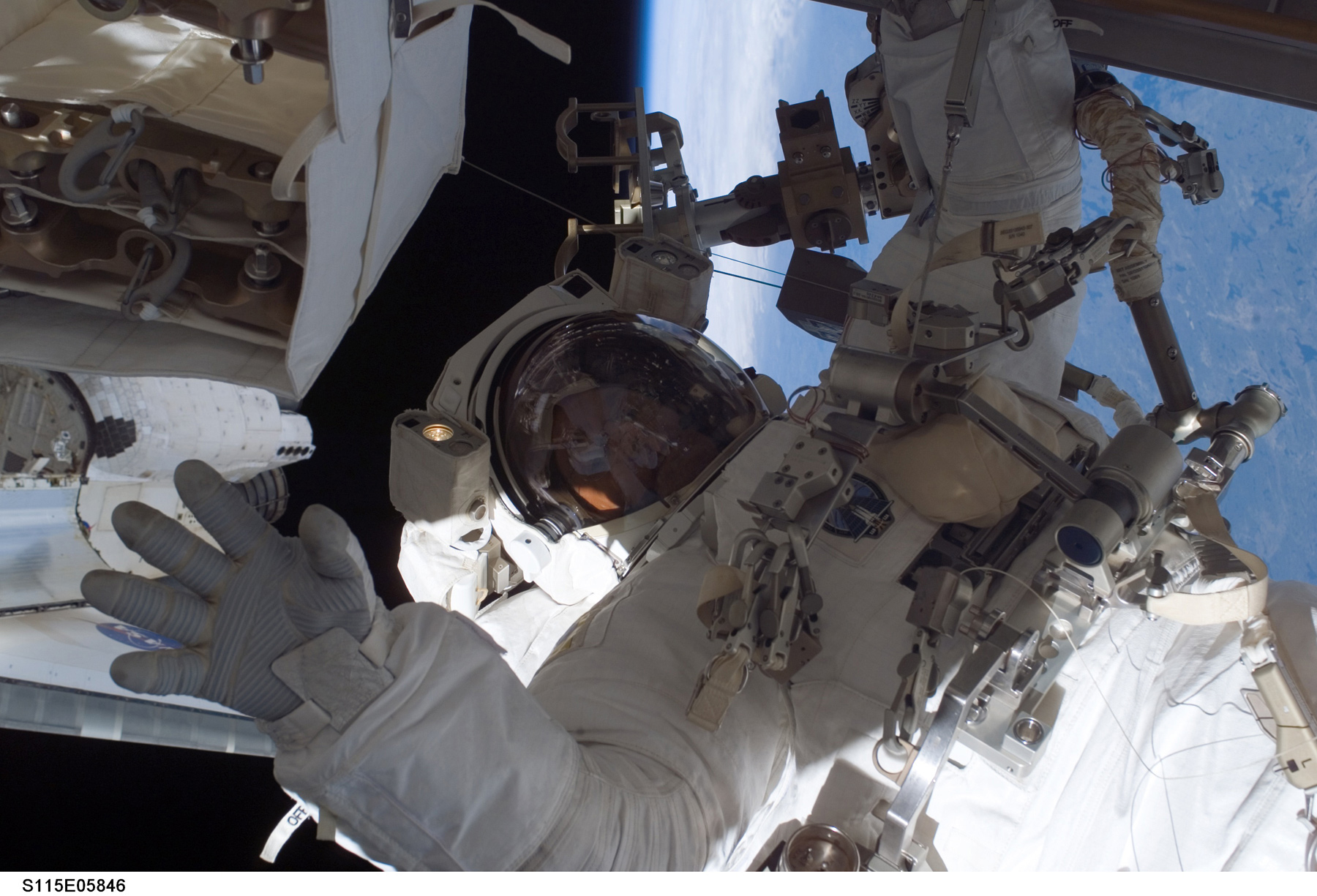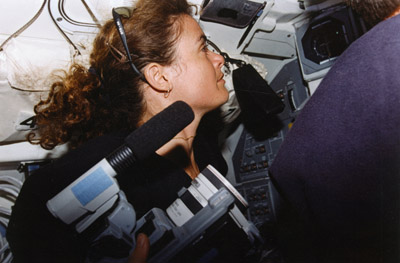David Saint-Jacques, OC, OQ, astronaut, engineer, astrophysicist, medical doctor (born 6 January 1970, in Québec City, QC). Early in his career, Saint-Jacques contributed to advances in telescope technology in Japan and Hawaii, and medical technology at Lariboisière Hospital in Paris. (See also Astronomy; Medical Research; Technology in Canada.) He also worked as a doctor and co-chief of medicine at the Inuulitsivik Health Centre in Puvirnituq, Nunavik. In 2009, he was chosen by the Canadian Space Agency to become an astronaut. In 2018, he served on the International Space Station for 204 days, longer than any other Canadian astronaut.

Education and Career
David Saint-Jacques was born in Québec City on 6 January 1970. He grew up in Saint-Lambert, a small, residential city on the south shore of the St. Lawrence River across from Montreal. His father and grandfather were both engineers. (See also Engineering.) In 1993, he earned a Bachelor of Engineering degree in engineering physics from Polytechnique Montréal (formerly École Polytechnique de Montréal).
He then worked for a time in biomedical engineering at the Lariboisière Hospital in Paris. Saint-Jacques was part of the team improving the design of radiological equipment for cine-angiography, the recording of fluoroscopic images of the chambers and blood vessels of the heart.
In 1998, he earned a PhD in astrophysics at Cambridge University in the United Kingdom.
While completing his PhD, Saint-Jacques contributed to advances on Cambridge’s Optical Aperture Synthesis Telescope and the Canary Islands’ William Hershel Telescope. His post-doctoral work included helping to develop the Mitaka infrared interferometer array in Japan and the Subaru telescope adaptive optics system at the Mauna Kea Observatory in Hawaii (see Observatory).
In 2001 he returned to Canada, where he worked with other astrophysicists at the Université de Montréal (see Astrophysics). Saint-Jacques completed his medical degree at Université Laval in Québec City in 2005. He also undertook more medical training in Lebanon and Guatemala. In 2007, Saint-Jacques completed his residency at McGill University in Montreal and focused on practicing medicine in remote communities.
David Saint-Jacques began his medical career in Puvirnituq, Nunavik, a small Inuit village on the shore of Hudson Bay. He was the co-chief of medicine at the Inuulitsivik Health Centre, providing medical care to seven Inuit communities. He also worked as an adjunct professor of family medicine at McGill University, supervising medical trainees in Nunavik.
Astronaut

In May 2009, following a rigorous selection process involving over 5,000 candidates, the Canadian Space Agency chose David Saint-Jacques to be one of two new Canadian astronauts. He moved to Houston to begin his astronaut candidate training with the National Aeronautics and Space Administration (NASA). He graduated in 2011.
Saint-Jacques’ first major assignment was as part of the international crew at NASA’s Extreme Environment Mission Operations near Key Largo, Florida. He and fellow Canadian astronaut Jeremy Hansen worked with others from the class of 2009, learning to navigate a DeepWorker submarine while completing experiments during a 13-day underwater mission designed to simulate work on an asteroid.
He also completed training in International Space Station systems. In the United States and Russia, he learned about space walks, robotics, summer and winter wilderness survival tactics, and how to fly a T38-N jet.
In 2012, Saint-Jacques undertook a challenging training mission called Cooperative Adventure for Valuing and Exercising Human Behaviour and Performance Skills (CAVES). It simulates working in the international space station by having astronauts live and conduct experiments in cramped quarters in a cave, 4 km underground. Participants learned to cooperate as a team while enduring difficult working and living conditions.
Expedition 58/59

The International Space Station (ISS) was built through the cooperative efforts of the United States, Russia, Europe, Japan and Canada. Since construction began in 1998, it has orbited 400 km above the earth at a speed of 28,000 km per hour. Since 2000, it has been occupied by astronauts from at least 20 countries who conduct experiments in its six laboratories with the goal of advancing space exploration while benefitting life on earth.
In May 2016, Saint-Jacques was chosen to serve on the Expedition 58/59 mission to the ISS. David Saint-Jacques personally named the mission Perspective. According to the Canadian Space Agency, Saint-Jacques explained, “I'm looking forward to seeing our home from space for myself, without borders or differences, and can't wait to share my experience and new perspective with others." To prepare for the mission he undertook two more years of intense training in the United States, Canada, Europe, Japan and Russia.
With American astronaut Anne McClain and Russian cosmonaut Oleg Kononenko, Saint-Jacques blasted off from a base in Kazakhstan on 3 December 2018. They would not return to earth until 24 June 2019. To date, his 204 days in space is the longest mission of any Canadian astronaut. During the mission, he conducted many experiments, acted as the crew’s medical officer, completed maintenance tasks and operated the Canadarm 2. He also became the fourth Canadian astronaut to conduct a spacewalk.
While serving on the ISS, Saint-Jacques sent many photographs and videos to earth. He also participated in Exploring Earth, an educational program designed for students that used pictures he was taking from space to enhance understanding of the earth’s geological and built features.
When asked what motivates him to undertake challenges in so many fields, Saint-Jacques said, “To understand: that is my main motivation…I've always wanted to get to the bottom of things and go beyond books and theory. I'm naturally curious and drawn by discovery and adventure.”
Personal Life
David Saint-Jacques is married to Dr. Véronique Morin, a family doctor with a master’s degree in public health who has practiced medicine in Nunavik, Montreal and Houston, Texas. They have three children, Pierre, Léon and Sophie.
Saint-Jacques obtained his commercial pilot and advanced scuba diving licences, and enjoys sailing, cycling, mountain climbing, skiing and rowing. He is fluent in English and French and speaks conversational Russian, Japanese, and Spanish. (See also Languages in Use in Canada.)
Honours and Awards
- Canada Scholarship (1989 to 1993)
- "1967" Science and Engineering Scholarship, Natural Sciences and Engineering Research Council of Canada (1994 to 1998)
- Honorary Scholar, Cambridge Commonwealth Trust (1994 to 1998)
- United Kingdom Overseas Research Student Award (1994 to 1998)
- Canadian Space Agency Supplement Scholarship, Canadian Space Agency (1994 to 1998)
- Post-doctoral Fellowship, Japan Society for the Promotion of Science (1999 to 2001)
- Canada Millennium Scholarship, Canada Millennium Scholarship Foundation (2001 to 2005)
- Honorary Doctorate, Polytechnique Montréal (2010)
- Medal of Honour, National Assembly of Québec (2013)
- Gold Medal, Royal Canadian Geographical Society (2014)
- Officer, National Order of Québec (2020)
- Honorary Doctor of Science, Western University (2022)
- Officer, Order of Canada (2022)

 Share on Facebook
Share on Facebook Share on X
Share on X Share by Email
Share by Email Share on Google Classroom
Share on Google Classroom












